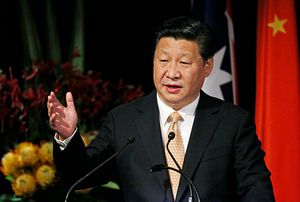Much like a dragon, “the ruler of men has bristling scales. Only if a speaker can avoid brushing against them can he have any hope of success.”
That, at least, is the dilemma facing Chinese statesmen as described by the ancient philosopher Han Feizi. Officially repudiated – but still influential – throughout China’s 2000+ years of imperial rule, he and his “Legalist School” have gained new prominence recently due to favorable citations by PRC leaders. Above all, those include references made by President Xi Jinping, China’s most powerful ruler in decades. Far from mere casual remarks, such statements serve as ideological guideposts to determine the Communist Party line. Just one sentence of Han Feizi’s that Xi quoted last autumn, for example, subsequently appeared thousands of times in official Chinese media at the local, provincial, and national levels.
Autocrat or Realist?
The trend has been interpreted in various ways. In October, the New York Times called President Xi Jinping’s uses of ancient thought “an overlooked key to his boldly authoritarian agenda,” and specifically noted the importance of Han Feizi, “a Chinese nobleman renowned for his stark advocacy of autocratic rule.”
While many experts would agree with that characterization, even referring to Han Feizi as “China’s Machiavelli,” others see him, and Legalist thought in general, in more positive terms. Scholars Orville Schell and John Delury, in an influential book on the history of Chinese reform efforts, credit “pragmatic” Legalist thought as being behind both much of China’s historical success and its ongoing rebirth as a great nation. For Confucians, who focus on ideals of loyalty, righteousness, and benevolence, little could be more repugnant than the Legalist position that “if a wise ruler masters wealth and power, he can have whatever he desires.”
Yet Han Feizi’s ideas, and Xi’s uses of them, are far from mere illiberal posturing. Even the remarks cited by the New York Times (the same ones subsequently reprinted thousands of times in Party media) were actually a warning by Xi to the country’s high level political leaders that “when those who uphold the law are strong, the state is strong. When they are weak, the state is weak.” The statement is at once striking, suggestive, and highly ambiguous.
In this sense, Xi’s use of ancient scholarship resembles the other activities characteristic of his unique administration. Observers are divided on how to interpret his high-intensity crackdown on corruption, nearly unprecedented personal popularity, and high-profile reforms aiming for “the rule of law.” Thus, his use of reformist-sounding language can be more than enough to prompt guarded optimism among observers both domestic and foreign. Other analysts, however, remain highly skeptical; pointing to several other statements where Xi vows to crush dissent, resist the West, and ensure ideological unity.
Language and Power
Yet people on both sides more or less admit that while China’s fate increasingly turns on the thoughts and beliefs of one man, there is no clear consensus on what that man actually thinks or believes. That is why the most valuable insight to gain from his Legalist references may actually relate to a more basic question. What can Xi’s many prominent political pronouncements reveal about his political beliefs?
On this topic, Han Feizi’s overall pragmatic approach begins the moment an aspiring politician opens his mouth to speak. Like Machiavelli in the West, he lived in a dangerous political climate where a wrong word could result in disgrace, exile, or worse. As he explicitly stated in his writing, the first task of any political theorist is to avoid getting on his prince’s bad side; or “brushing against the ruler’s scales.” Discretion, and subtlety, are the key to achieving influence. Ideals, and morals, are to be kept private.
Based on that perspective, if Xi really is especially influenced by the Legalist School, it means two important things for his future trajectory. First, neither his calls for reform nor his illiberal pronouncements should be taken as simple statements about what he believes. Instead, he is likely using different forms of compromise language that various factions can agree upon. Xi’s patchwork political platform can be seen as maintaining his own place of authority, largely by avoiding the potential wrath of the Communist Party’s elders and many elite interest groups: the “dragon” whose scales he risks rubbing the wrong way.
Secondly, as a ruler Xi’s signature initiatives – especially his dramatic and escalating crackdown on official corruption – probably do not reflect either high idealism or a mere power grab. Xi undoubtedly does have a vision for where he wants to take his country, his own “Chinese Dream,” but he is unlikely to be so foolish as to try to realize that dream too early. In order to achieve his goals, Xi first has to “master wealth and power,” and a robust, predictable legal system is one key to such mastery.
Pragmatist in Chief
As a recent People’s Daily editorial admits, it is simply beside the point to ask whether or not Xi intends for “the rule of law” to limit the Party’s authority, or his own as the Party’s representative. Very pragmatically – very much like a Legalist – Xi is looking for formulas that can achieve his goals for the nation. For now, the wealth of corrupt officials has to be seized, and the power of elites over the law has to be abolished. It doesn’t much matter whether that process is called liberal or conservative, left or right, traditional or modern. What matters, at least for the moment, is whether or not it works.
Ryan Mitchell is pursuing a Ph.D. in Law at Yale, where his research focuses on political philosophy and international law. He is also an attorney admitted to the State Bar of California.

































